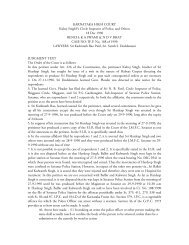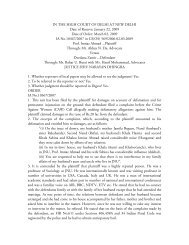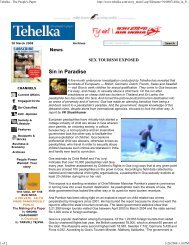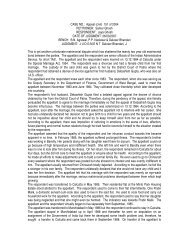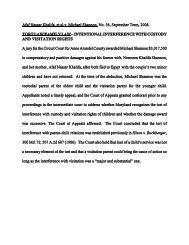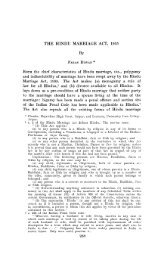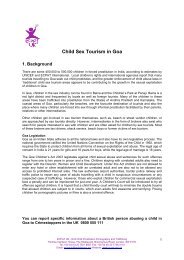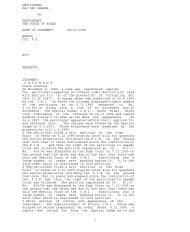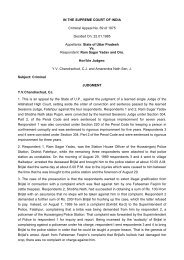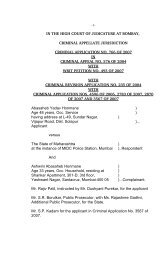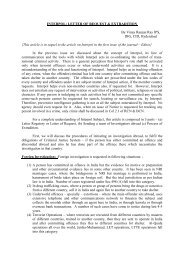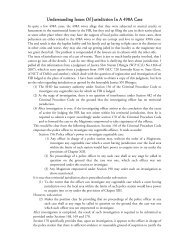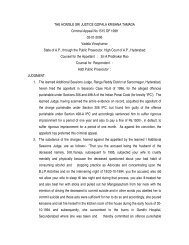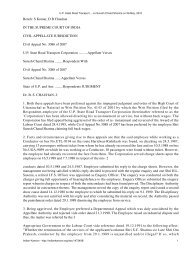MANJU RAM KALITA – Vs- Assam – 2009 - IPC 498A
MANJU RAM KALITA – Vs- Assam – 2009 - IPC 498A
MANJU RAM KALITA – Vs- Assam – 2009 - IPC 498A
You also want an ePaper? Increase the reach of your titles
YUMPU automatically turns print PDFs into web optimized ePapers that Google loves.
JUDGMENT: Dr. B.S. Chauhan, J.IN THE SUPREME COURT OF INDIACRIMINAL APPELLATE JURISDICTIONCRIMINAL APPEAL NO. 299 OF 2003<strong>MANJU</strong> <strong>RAM</strong> <strong>KALITA</strong> .... Appellant VersusSTATE OF ASSAM .... Respondent1. This Appeal has been preferred against the Judgment and Order dated 21st December,2001 of the High Court of Gauhati in Criminal Revision (P) No. 578 of 2000 by whichthe High Court concurred with the finding of facts, recorded by the Trial Court dated22.12.1999 passed by the Addl. Chief Judicial Magistrate, Kamrup, Guwahati in CaseNo. G.R.1957/1997; and of the Appellate Court, the Sessions Judge, Kamrup dated13.10.2000 passed in Criminal Appeal No.3 of 2000 that the appellant was guilty ofcommitting the offences under Sections 494 and <strong>498A</strong> of the Indian Penal Code (inshort "I.P.C") and sentenced him to undergo rigorous imprisonment for 2 years u/S<strong>498A</strong> and for 3 years u/S 494 I.P.C. However, both the sentences were directed to runconcurrently.2. The facts and circumstances giving rise to this appeal are that the appellant, a Governmentservant, got married with Smt. Minati Das (Kalita), the complainant on 5.2.1992 as perHindu rites. Smt. Minati Das (Kalita) gave birth to a male child on 10.3.1993. However,the relationship between the husband and wife were not cordial as it was alleged by thewife that she was being tortured mentally and physically by the Appellant. She left thematrimonial home and started living with her father and was residing therein since 1993.In 1997, she came to know that the appellant got married with one Ranju Sarma on2.2.1997 at Tukeswari Temple. Thus, she filed an FIR against the appellant.3. The appellant was charged under Sections <strong>498A</strong>/494 <strong>IPC</strong> by CJM, Guwahati. Theappellant defended himself before the Trial Court denying all the charges. However,considering the evidence on record, the Trial Court found both the charges provedagainst the appellant beyond reasonable doubt and after convicting him, for the saidoffences, awarded the sentences as mentioned here- in- above, vide judgment and orderdated 22.12.1999. (Annexure P-12)4. Being aggrieved, the appellant preferred Appeal No.3 of 2000 which was dismissed by theAppellate Court vide Judgment and Order dated 13.10.2000 (Annexure P-13).5. The appellant further approached Gauhati High Court by filing Criminal Revision (P)No. 578 of 2000 which has been dismissed by the impugned Judgment and Order dated21st December, 2001. Hence, this Appeal.6. Shri S.K. Bhattacharya, learned counsel appearing for the appellant has raised all thecontentions which the appellant has raised before the courts below, inter alia, that therewas no valid marriage with Smt. Ranju Sarma as the marriage had taken place before aHindu Deity and that there was no case of mental or physical torture to bring home thecharges under Section <strong>498A</strong> <strong>IPC</strong>. Thus, the appeal deserved to be allowed.
7. On the contrary, Mr. Riku Sharma, learned counsel appearing on behalf of therespondent State submitted that there are concurrent finding of facts by three courtsbelow so far as the issue of marriage of the appellant with Smt. Ranju Sarma isconcerned. This Court should not interfere with the findings so recorded, being thefourth court entertaining this matter. So far as the attraction of the provisions of Section498 A is concerned, it was submitted that the appellant subjected the complainant(legally wedded wife) to physical and mental torture and agony; thus the charges haverightly been found proved against him by all the three courts. Therefore, there is nooccasion for this Court to interfere in the matter. The appeal is liable to be dismissed.8. We have considered the rival submissions made by learned counsel for the parties andperused the record.9. So far as issue no. 1 is concerned i.e. as to whether the appellant got married with Smt.Ranju Sarma, is a pure question of fact. All the three courts below have given concurrentfinding regarding the factum of marriage and its validity. It has been held to be a validmarriage.10. It is settled legal proposition that if the courts below have recorded the finding of fact,the question of re-appreciation of evidence by the third court does not arise unless it isfound to be totally perverse. The higher court does not sit as a regular court of appeal.It's function is to ensure that law is being properly administered. Such a court cannotembark upon fruitless task of determining the issues by re-appreciating the evidence.This Court would not ordinarily interfere with the concurrent findings on purequestions of fact and review the evidence again unless there are exceptional circumstancesjustifying the departure from the normal practice. The position may undoubtedly bedifferent if the inference is one of law from the facts admitted and proved or where thefinding of fact is materially affected by violation of any rule of law or procedure. (VideFirm Sriniwas Ram Kumar <strong>Vs</strong>. Mahabir Prasad & Ors.; AIR 1951 SC 177; M/s. TulsiDas Khimji <strong>Vs</strong>. The Workmen, AIR 1963 SC 1007; and Pentakota Satyanarayana &Ors. <strong>Vs</strong>. Pentakota Seetharatnam & Ors., AIR 2005 SC 4362).11. Where the court below considered the material facts and did not take into considerationany inadmissible evidence etc., the interference is not required by court on thirdinstance. (vide Madhavan Nair vs. Bhaskar Pillai, (2005) 10 SCC 553.)12. Thus, it is evident from the above that this Court being the fourth Court should notinterfere with the exercise of discretion by the courts below as the said courts haveexercised their discretion in good faith giving due weight to relevant material andwithout being swayed by any irrelevant material. Even if two views are possible on thequestion of fact, we, being the fourth court, should not interfere even though we mayexercise discretion differently had the case come before us initially.13. In view of the above, we are not inclined to interfere with the finding of fact so far as theissue of bigamy is concerned nor the quantum of punishment on this count required tobe interfered with.
"17. ...It is not necessary to prove that the mental cruelty is such as to causeinjury to the health of the petitioner. While arriving at such conclusion, regardmust be had to the social status, educational level of the parties, the society theymove in, the possibility or otherwise of the parties ever living together in casethey are already living apart and all other relevant facts and circumstances whichit is neither possible nor desirable to set out exhaustively. What is cruelty in onecase may not amount to cruelty in another case. It is a matter to be determined ineach case having regard to the facts and circumstances of that case. If it is a caseof accusations and allegations, regard must also be had to the context in whichthey were made........... The context and the set up in which the word `cruelty'has been used in the section seems to us, that intention is not necessary elementin cruelty. That word has to be understood in the ordinary sense of the term inmatrimonial affairs. If the intention to harm, harass or hurt could be inferred bythe nature of the conduct or brutal act complained of, cruelty could be easilyestablished. But the absence of intention should not make any difference in thecase, if by ordinary sense in human affairs, the act complained of could otherwisebe regarded as cruelty."18. In Mohd. Hoshan v. State of A.P.; (2002) 7 SCC 414, this Court while dealing with thesimilar issue held that mental or physical torture should be "continuously" practiced bythe accused on the wife. The Court further observed as under:"Whether one spouse has been guilty of cruelty to the other is essentially a questionof fact. The impart of complaints, accusations or taunts on a person amounting tocruelty depends on various factors like the sensitivity of the individual victimconcerned, the social background, the environment, education etc. Further, mentalcruelty varies from person to person depending on the intensity of sensitivity and thedegree of courage or endurance to withstand such mental cruelty. In other words,each case has to be decided on its own facts to decide whether the mental cruelty wasestablished or not."19. In Smt. Raj Rani v. State (Delhi Administration); AIR 2000 SC 3559, this Court heldthat while considering the case of cruelty in the context to the provisions of Section<strong>498A</strong> I.P.C., the court must examine that allegations/accusations must be of a very gravenature and should be proved beyond reasonable doubt.20. In Sushil Kumar Sharma vs. Union of India, AIR 2005 SC 3100, this Court explainedthe distinction of cruelty as provided under Section 306 and <strong>498A</strong> <strong>IPC</strong> observing thatunder Section <strong>498A</strong> cruelty committed by the husband or his relation drive woman tocommit suicide etc. while under Section 306 <strong>IPC</strong>, suicide is abated and intended.Therefore, there is a basic difference of the intention in application of the said provisions.21. In Girdhar Shankar Tawade v. State of Maharashtra, AIR 2002 SC 2078; this Courtheld that "cruelty" has to be understood having a specific statutory meaning provided inSection <strong>498A</strong> I.P.C. and there should be a case of continuous state of affairs of torture byone to another.
22. "Cruelty" for the purpose of Section 498-A I.P.C. is to be established in the context of S.498-A <strong>IPC</strong> as it may be a different from other statutory provisions. It is to bedetermined/inferred by considering the conduct of the man, weighing the gravity orseriousness of his acts and to find out as to whether it is likely to drive the woman tocommit suicide etc. It is to be established that the woman has been subjected to crueltycontinuously/persistently or at least in close proximity of time of lodging the complaint.Petty quarrels cannot be termed as `cruelty' to attract the provisions of Section 498-A<strong>IPC</strong>. Causing mental torture to the extent that it becomes unbearable may be termed ascruelty.23. The instant case required to be examined taking into consideration the aforesaid settledlegal provisions. Undoubtedly, there had been complaint by the wife of physical andmental torture upto 1993 when she left the matrimonial home and started living withher father. The complaint of cruelty was lodged by filing an FIR on 23.5.1997 i.e. afterfour years of leaving the matrimonial home. More so, the mental or physical torture wasnot continuous on the part of the appellant as there is no complaint against him between1993 to 1997 i.e. leaving the matrimonial home by the wife and performing the secondmarriage by the husband.24. The complainant Smt. Minati Das (Kalita) P.W.3 deposed that she had been torturedphysically and mentally but there was no allegation that she was subjected to physical ormental torture after the birth of the child in 1993. Similarly, Shri Lakhi Kt. Das(P.W.1), the father of the complainant has not mentioned any incident of physical ormental torture after 1993. None of the witnesses examined in this respect deposed thatthere was a continuous physical or mental torture and some untoward incident occurredbetween the husband and wife after 1993.25. The Trial Court, after considering the depositions, came to the conclusion that theappellant being husband of the complainant subjected her to cruelty both mental andphysical. But it further held as under:"No doubt there is no evidence on the record to show that the accused committedharassment on P.W.3 with a view to force her to commit suicide or to fulfil illegaldemands of him. The continuous harassment, both physical and mental by theaccused made her life miserable and forced her to live separately from her husband."(Emphasis added)26. The Appellate Court dealt with the issue as under:"Her specific evidence is that the cruelty both physical and mental was meted to herby her husband after the marriage and this has been well supported by the evidenceof the witnesses as discussed above. Her mental torture had reached to such an extentthat she had to leave her matrimonial home along with the baby in the womb andthis has been well testified in the evidence on record." (emphasis added)27. The High Court considered the issue and reached the conclusion:"The offence u/S 498 A <strong>IPC</strong> is punishable with imprisonment upto three years onlyand as such the prosecution is barred u/S468, Cr.P.C. In view of the catena ofdecisions of the Apex Court, the law is well settled that offence of cruelty to wife is a
continuing offence. Hence the fact that the wife was not living with the husbandsince 1993 is immaterial and mental and other cruelty may be committed even afterthe parties living separately."The High Court further held that during the subsistence of the marriage, the appellantcontracted second marriage and started living with the another woman that itself was acruelty and therefore he was liable for the punishment under Section 498 A.28. Thus, from the above, it is evident that the Trial Court itself had been of the view thatthere was no evidence of cruelty on the part of the appellant with a view to drive thecomplainant to commit suicide. The appellate Forum reached the conclusion that mentaltorture was of the magnitude that the complainant had to leave her matrimonial homeduring her pregnancy. The Revisional court did not find that the complainant had beensubjected to cruelty continuously.29. Thus, in our opinion, all the three courts below erred in not considering the case incorrect perspective. The findings so recorded by the Courts below may be relevant forgranting the relief in a matrimonial dispute i.e. divorce etc. but could not bring home thecharge under Section 498-A <strong>IPC</strong>.30. Thus, in view of the aforesaid, conviction of the appellant under Section 498-A <strong>IPC</strong> andpunishment for the said offence awarded by the courts below are set aside. However,conviction and sentence under Section 494 <strong>IPC</strong> are maintained.31. Appeal succeeds to the said extent and disposed of accordingly..........................................J. (Dr. Mukundakam Sharma).........................................J. (Dr. B.S. Chauhan)New Delhi: 29th May, <strong>2009</strong>.



